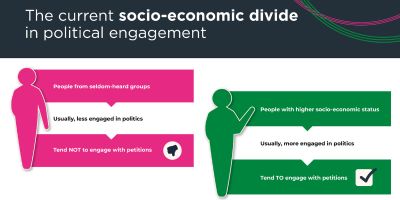What can we expect at COP28? Professor Richard Beardsworth interview

On the eve of COP28, Professor Richard Beardsworth shares his expectations for the conference.
With COP28 fast approaching, we talk to Richard Beardsworth, Professor of International Politics, Head of the School of Politics and International Studies and Co-chair of the UNFCCC Task Force, about the challenges facing the COP28 delegates and his thoughts for the future.
What are the challenges facing COP28?
The two most important (and overlapping) challenges for COP28 are response to the ‘Global Stocktake’ (GST) and climate finance. Between them, they concern the transition from carbon to clean energy economies – ‘the energy transition’ – and the transition from carbon to clean energy societies ‒ ‘the just energy transition’.
The first ‘Global Stocktake’ (GST) since the Paris Agreement in 2015 concludes in Dubai. The Paris Agreement in 2015 set the maximum rise of global warming to 2°C with a lower achievable limit of 1.5°C (1.5°C has been accepted as the target since COP25).
To achieve this target, developed and developing countries submit either Nationally Determined Contributions (NDCs) and/or National Adaptation Plans (NAPs) that aim to align with the UNFCCC target of 1.5°C. The developed countries ‘take the lead’ given their historical responsibility for climate change and their respective capacities. Aligned with this temperature target, although not covering all greenhouse gases (GHGs), is the ‘global carbon budget’.
The carbn budget explained
The carbon budget delimits the total additional quantity of C02 that can be released into the atmosphere for a named probability of not exceeding a given temperature threshold: one of the main scenarios with which the UNFCCC works is a 50% probability that the planet remains under 1.5°C.
Now, the summary report of the GST published this September forcefully states that the world is way-off target. The remaining carbon budget aligned to 1.5°C is, for example, estimated by University of Leeds climate scientists (among others) at six to seven years. Most importantly, therefore, NDCs are not ambitious enough, with global GHG emissions not yet peaking, let alone declining. The GST summary report ‒ together with another critical report that has come out in anticipation of COP28, the International Energy Agency’s NetZero Roadmap: A Global Pathway to Keep the 1.5°C Goal in Reach ‒ summarizes what action needs to be taken.
- With fossil fuels contributing 75% to GHG emissions, fossil fuel production and use must be phased out. Here the language can shift quickly, with the GST report speaking more of ‘unabated’ fossil fuels (I will come back to this later).
- Coal must end in developed countries by 2030 and developing countries by 2040.
- Methane emissions should be cut by up to 45% by 2030.
- The lay-out of renewables should be accelerated by a factor of three.
- Energy efficiency should be improved by a factor of two.
The first three points concern ‘mitigation’ alone (reducing GHG emissions). The last two points concern both mitigation and ‘adaptation’ (building resilience to accelerating climate realities, particularly in the more vulnerable countries). What lies behind all these 1.5°C-aligned requirements is the need for climate finance. Following the collective response to the GST, climate finance will be the second major concern at COP28.
At COP28 trust between developed and developing countries must be first reset by fulfilling prior financial commitments: completion of the Green Climate Fund, of the $100 billion per annum to support climate action in developing countries, the doubling of climate adaptation funds, and the operationalization of the Loss and Damage fund (set up at last year’s COP27 in Egypt).
Together with these existing priorities (which is already a lot given how slow finance agreements have been up to this point!), COP28 will look to make further decisions on reform of the international finance architecture: particularly, suspension of debt, the rate of interest for capital loans to developing countries (often costing 2‒3 times more than that in Europe), and the use of international reserve assets for adaptation needs. These reforms will also help leverage private capital investment; the GST summary estimates $1 trillion per annum is required to facilitate the transition to clean energy in the Global South.
Where is collective action likely?
COP28 will be run by the UAE presidency under Sultan Al Jaber. The presidency organizes all parties throughout the negotiations towards the final ‘decision text’ which states the outcome decisions at the end of the two-week meeting.
He is known as both chair of the national oil company and the highly successful renewables company, Masdar. From everything that the presidency has put in place to date, Al Jaber will look to a collective decision on the phasing out of ‘unabated’ fossil fuels.
The term ‘unabated’ allows for the continuing production and use of fossil fuels in the context of abatement technologies like carbon capture and storage (CCS). Although these technologies will never be at scale in the next twenty years to mitigate the fossil fuel industry’s planned release of C02, the word ‘unabated’ (as used in the GST report) will probably allow for some form of collective agreement on point 1 above.
There will also be collective action on the other four points, but the devil will be in the detail (percentages and timelines agreed). Good news-reporting over the two weeks of COP28 as well as the final decision text itself will track these details.
The same must be said for climate finance. Momentum for collective action among governments, multilateral development banks, and public-private partnerships is building on all the climate initiatives above. COP28 will accelerate further this momentum; what is nailed down at the conference itself (international financial reform; the benefactors and beneficiaries of the Loss and Damage fund, etc.), is to be seen.
What are the obstacles?
To my mind, there are two major obstacles. First, mistrust between developed and developing countries remains huge and could easily scupper agreement between and among the UNFCCC negotiating groupings.
At the basis of the UNFCCC framework lies the equity principle of ‘Common but differentiated responsibilities and respective capacities’ as well as the division among industrialized countries, economies in transition, and developing countries, with industrialized countries taking the lead on mitigation strategies and financing adaptation strategies (given their historical responsibility and respective capacity).
For developing countries (with the partial exception of China and its bilateral climate partnership with the US), industrialized countries have not assumed their responsibilities enough, either domestically or in terms of international cooperation.
For the industrialized countries, some of the developing countries (China and India are the outstanding two) have not assumed their responsibilities enough, focused on the discourse of poverty reduction. In the last few years, the energy transition has moved the dial so that sustainable energy and poverty reduction are beginning to be thought and practised together. It is nevertheless the case that continuing lack of financial commitments and the way in which industrialized countries dug themselves out of the present energy crisis through a ‘gas bonanza’ leaves many countries still sceptical of genuine collective action.
Second, as said, the phasing out of ‘unabated’ fossil fuels will be on the agenda, but it is not yet clear how far it will advance. At COP27 any attempt for a decision on this was scuppered by the OPEC grouping, led by Saudi Arabia and Russia. COP28 will be different, and here the fact that COP28 is presided by UAE is ambivalent – it means that no major party will talk of phasing out fossil fuels as such, but it could facilitate negotiations on ‘unabated’ fuels.
The obstacle to any agreement on collective action remains nevertheless the producer countries themselves, particularly those whose national revenues absolutely depend on oil and gas (the worst here are sub-Saharan producer countries like Nigeria, the Congo, Gabon).
Unless there is concerted effort (strong ‘international cooperation’) to show management at one and the same time of the acceleration of renewable energy systems and of the phasing-out of ‘unabated’ fossil fuel, agreeing this phasing-out will remain difficult and/or will be full of temporal loopholes. The fact that there will again be a large contingent of fossil fuel company representatives at COP28 – companies that have shown almost zero interest in reinvesting in renewables despite their windfall profits in the last two years – shows the political challenge ahead.
What are the important differences?
Following on from the last question, they are the differences between 1) short-term energy security (supply) and ‘longer-term’ climate objectives (decarbonisation); 2) the priorities of developed countries (mitigation/adaptation) and developing countries (poverty reduction/adaptation/ reparation); 3) the priorities of non-fossil fuel producing countries (decarbonisation) and fossil-fuel producing countries (national growth and political stability).
These differences could ultimately work together to stop progress. The lack of an effective international coordination mechanism within the UNFCCC to facilitate transparently and equitably the management of the energy transition becomes more and more telling in regard of these differences. Given the terms of present national politics and geopolitics, such a sovereign body is however unrealistic. Climate diplomacy and climate leadership will therefore be of paramount importance during the meeting.
How can non-experts keep up with the news from COP28?
Within the university: Delegates from the University of Leeds will be reporting back to the university as part of the UNFCCC task force’s concern to bring COP28 (and future UNFCCC activities) to Leeds. There will be postings on the university’s Priestley Centre for Climate Futures COP28 webpage and across their social media channels (Twitter and LinkedIn).
The Priestley Centre’s website in general is an excellent place for climate information and resources. There will also be de-briefings by the UNFCCC task force after COP28 (again well-advertised through email and through the Priestley Centre).
Outside of the university: the UN COP28 and COP28 UAE websites will have regular updates and will publish decision documents. For independent analysis, journalists like Fiona Harvey of the Guardian, Emily Atkin of Heated and Amy Westervelt of Drilled are always incisive and provocative. The more analytical websites of Climate Action Tracker, Climate Analytics and Energy Monitor will hold important updates on mitigation targets and the energy transition.
I am a fan of Cristiana Figueres’ podcast Optimism and Outrage (she was a brilliant executive secretary of the UNFCCC from 2010 up to the Paris Agreement), because of the climate experts featured, the hosts’ own climate analysis, and their continuing ability to be both outraged and optimistic in one. They will certainly present an interesting diagnosis of COP28.
What could we take away from COP28 to give the younger generations future direction and a sense of hope?
Following on, I would certainly recommend listening to the podcast Optimism and Outrage after COP28 and following the analyses in Carbon Action Tracker and Carbon Brief.
With regard to everything I have said, I think it important to see where, after COP28, we stand on the phasing-out of fossil fuels and to place our hope both in what is actually agreed at COP28 and in all that will still need to be done (ie: the energy transition is happening, and it is a question of constantly promoting it).
At the same time, what is agreed on climate finance should also give us some hope even if, as with the managed decline of fossil fuels, there will remain a lot to demand. But again, as with fossil fuels, it is not the conference as such that is important, but the dynamic that runs in and out of it. The Global Stocktake has sent a strong message to the parties of COP28 (the 196 signatory countries + the European Union) that ‘system transformation’ is now needed ‘in all sectors and in all contexts’.
Aided more by the reality of the coming energy transition than by present political leadership, future generations will want to work on system transformation, whatever their ‘sector’ or ‘context’.




